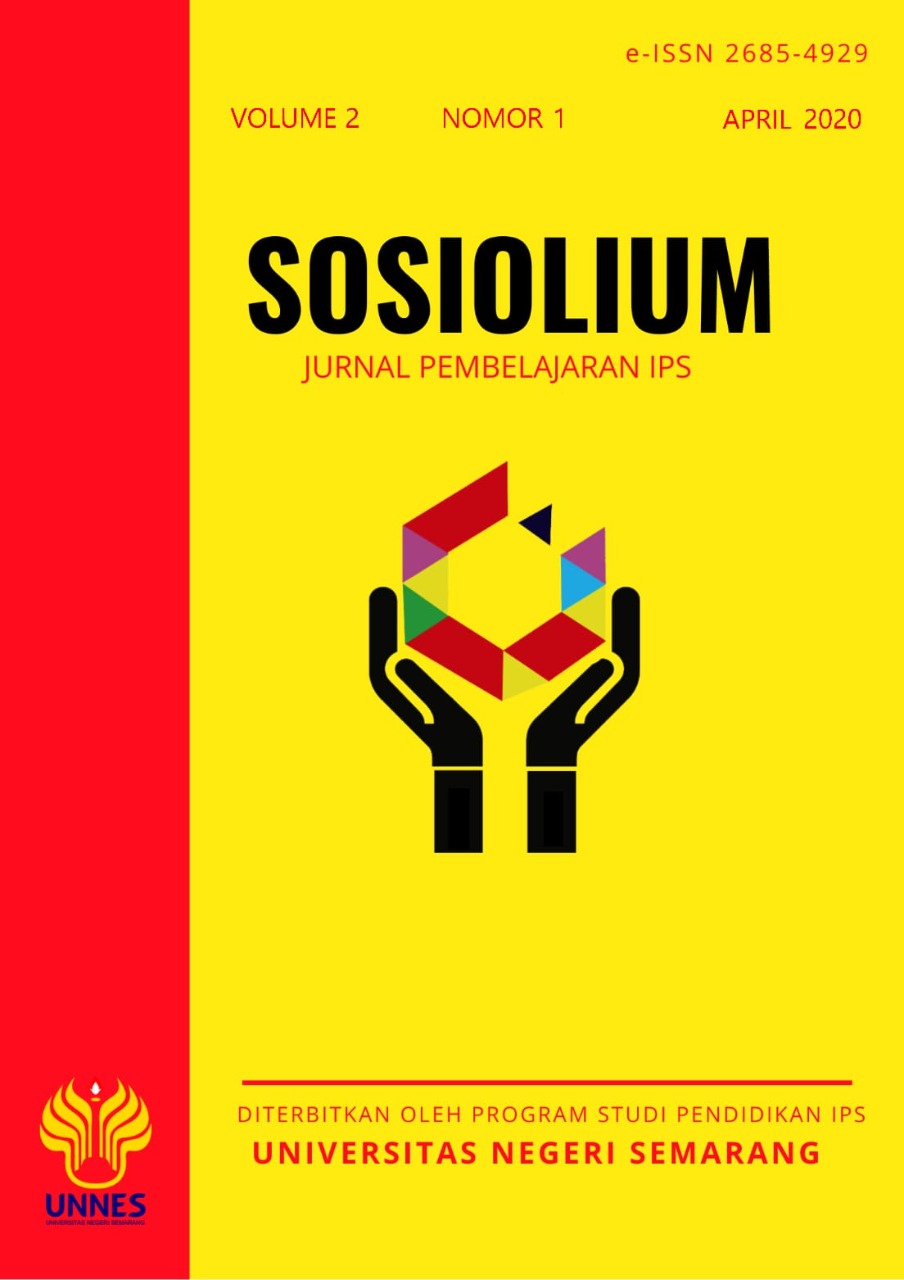EFEKTIVITAS PEMBELAJARAN IPS MENGGUNAKAN MODEL PEMBELAJARAN TUTOR SEBAYA PLUS PADA SISWA KELAS VIII SMP NEGERI 7 SEMARANG
##plugins.themes.academic_pro.article.main##
Abstract
The 2013 curriculum makes students the center of learning, but there are still many teachers becoming the center of learning in the classroom. Students have difficulty in studying social studies because they tend to feel bored, bored, and like listening to stories when the teacher explains. While students who catch lessons quickly, are lazy to share with their friends, for fear of competition. Researchers provide a peer tutoring learning model plus in learning social studies subjects. The experimental method used in this study is a quasi-experimental method. This design uses two groups, namely the experimental group and the control group. Based on the analysis of peer tutoring learning models plus effective on social studies results of VIII grade students of SMP Negeri 7 Semarang with the indicators achieved as follows. (1) The ability of the teacher in managing social studies learning for the experimental class gets very good criteria with the number of points 73 while for the control class gets the number of pont 58. (2) The activity of students in social studies learning for the experimental class gets very active criteria with a number of 97% while for the control class to get the amount of 12.5%. (3) The average posttest score of the control class (8G) was 80.66 and the experimental class (8F) was 87.92. (4) Positive responses of students in social studies learning for the experimental class get very active criteria with a total of 94% while for the control class get a total of 56%.
Kurikulum 2013 menjadikan peserta didik sebagai pusat pembelajaran, akan tetapi masih banyak guru menjadi pusat pembelajaran dikelas. Peneliti memberikan model pembelajaran tutor sebaya plus dalam pembelajaran mata pelajaran IPS. Metode eksperimen yang digunakan dalam penelitian ini adalah metode eksperimen semu. Desain ini menggunakan dua kelompok, yaitu kelompok eksperimen dan kelompok kontrol. Berdasarkan analisis model pembelajaran tutor sebaya plus efektif terhadap hasil IPS peserta didik kelas VIII SMP Negeri 7 Semarang dengan indikator yang dicapai sabagai berikut. (1) Kemampuan guru dalam mengelola pembelajaran IPS untuk kelas eksperimen mendapat kriteria sangat baik dengan jumlah poin 73 sedangkan untuk kelas kontrol mendapatkan jumlah pont 58. (2) Aktivitas peserta didik dalam pembelajaran IPS untuk kelas eksperimen mendapat kriteria sangat aktif dengan jumlah 97 % sedangkan untuk kelas kontrol mendapatkan jumlah 12,5% . (3) Nilai rata-rata posttest kelas kontrol (8G) sebesar 80,66 dan kelas eksperimen (8F) sebesar 87,92. (4) Respon positif peserta didik dalam pembelajaran IPS untuk kelas eksperimen mendapat kriteria sangat aktif dengan jumlah 94 % sedangkan untuk kelas kontrol mendapatkan jumlah 56%.
##plugins.themes.academic_pro.article.details##

This work is licensed under a Creative Commons Attribution-NonCommercial-ShareAlike 4.0 International License.
All writings published in this journal are personal views of the authors and do not represent the views of this journal and the author's affiliated institutions. Author(s) retain copyrights under the license of Creative Commons Attribution-NonCommercial-ShareAlike 4.0 International (CC BY-NC-SA 4.0).
References
Khairiah. 2018. Kesempatan Mendapatkan Pendidikan dalam Kajian Tingkat Pendidikan dan Pendapatan Keluarga. Yogyakarta: Pustaka Pelajar.
Mariani. 2015. Peningkatan Prestasi Belajar Siswa pada Materi Pembagian Bilangan Cach dengan Menggunakan Media Visual di Kelas II SD Negeri 2 Kota Banda Aceh. Dalam Jurnal Peluang. Vol 3, Nomor 2. Hal 1-12.
Muhardi. 2004. Kontribusi Pendidikan Meningkatkan Kualitas Bangsa Indonesia. Dalam Journal of Islamic Sustainable Development (JISD). Voulme XX Halaman 478-492.
Reziyustikha, Leni. 2017. Pembelajaran Kooperatif dengan Pendekatan Tutor Sebaya untuk Meningkatkan Hasil Belajar pada Mata Kuliah Aljabar Linear Mahasiswa Informatika. Jurnal Penelitian Pendidikan dan Pengajaran Matematika. Vol. 3, No. 2
Rusman. 2014. Model-model Pembelajaran. Bandung: PT Raja Grafindo Persada.
Sukardi, Dewa Ketut. 2000. Pengantar Pelaksanaan BK di Sekolah. Jakarta: PT Bina Aksara
Tambun, Holden. 2017. Pengembangan Perangkat Pembelajaran Berbasis Masalah Untuk Melatihkan Ketrampilan Metakognitif Siswa Kelas XI SMA. Jurnal Profesi Keguruan. Vol 3 No 2. Universitas Negeri Semarang.
